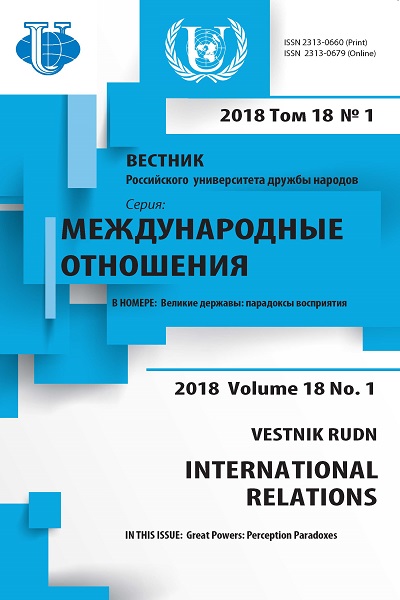Russia-India: new horizons of the strategic alliance
- 作者: Akarashov I.S.1
-
隶属关系:
- RUDN University (Peoples’ Friendship University of Russia)
- 期: 卷 18, 编号 1 (2018): Great Powers: Perception Paradoxes
- 页面: 148-161
- 栏目: 双方关系
- URL: https://journals.rudn.ru/international-relations/article/view/18383
- DOI: https://doi.org/10.22363/2313-0660-2018-18-1-148-161
如何引用文章
全文:
详细
The article examines the development of Russian-Indian trade and economic relations from 1992 to 2017. The relevance of the topic is that currently the economic sanctions of some Western countries and the USA against Russia forced to strengthen the Eastern vector of its foreign policy. India is a leading country in the South Asian region, has nuclear capabilities, has demonstrated high rates of socio-economic and military development, and it has all chances to be among the world powers. The rapid growth of India draws attention of politicians and scientists. Deeper cooperation with India may become a good stimulus for the development of the Russian economy and to deepen bilateral strategic relations, in the conditions of aggravation of competitive struggle in world politics and economy is extremely important for both countries. The study of the historical experience, its content, potential, problems and perspectives seem to be relevant and useful. In the study of this topic, the author has considered the formation of modern normative-legal base of Russian-Indian trade and economic relations, has studied the structure and dynamics of trade turnover, revealed the main causes of the existing problems and identified prospects. As a methodological basis of the present study, we used the historical descriptive method which allowed the author to analyze the history of Russian-Indian economic relations. The results of the analysis the author concludes that today, there are a number of external and internal factors that negatively affect economic relations between the two countries, but Indian and Russian governments are determined to strengthen relations in this area, creating a favorable environment for the development of business contacts between representatives of business circles of Russia and India, and the commitment to take economic relations to a level commensurate with the status of “privileged strategic partnership”.
作者简介
Ismail Akarashov
RUDN University (Peoples’ Friendship University of Russia)
编辑信件的主要联系方式.
Email: i.akarashov@gmail.com
postgraduate student of the Department of Theory and History of International Relations of the RUDN University
参考
- Chopra, R. (2008). Technology and Nationalism in India: Cultural Negotiations from Colonialism to Cyberspace. Amherst, NY: Cambria Press.
- Fets, K., Krovvidi, E., Zubacheva, K. & Smertina, K. (Eds.). (2015). A New Era: India-Russia Ties in the 21st. New Delhi: Russia Beyond The Headlines.
- Ivanov, I. (Ed.). (2013). Postulates on Russia-India Relations. Moscow: Spetskniga.
- Denisov, I.E. & Popadyuk, O.A. (2016). 100 Postulates on Russia—India Relations. Moscow: NPMP RIAC. (In Russ.).
- Kamenev, S. (2014). Energy of India: foreign assistance for the development of the industry. In: India: Energy and Energy Security. Moscow: IES of RAS, p. 16—32. (In Russ.).
- Kheyfets, B. (2014). Russia and the BRICS. New opportunities for mutual investments. Moscow: Dashkov and K°. (In Russ.).
- Kumar, S. (2017). India’s National Security: Annual Review 2015—16. New York: Routledge.
- Mallaby, S. & Volcker, P. (2016). Why India’s Economy is at the Head of the Pack. Council on Foreign Relations. URL: http://www.cfr.org/economics/why-indias-economy-head-pack/p37526 (accessed: 10.11.2017).
- Mohan, R. (2015). Nuclear Energy and Liability in South Asia: Institutions, Legal Frameworks and Risk Assessment within SAARC. New Delhi: Springer India. doi: 10.1007/978-81-322-2343-6.
- Pant, G. (2015). India’s Emerging Energy Relations: Issues and Challenges. New Delhi: Springer. DOI: https://doi.org/10.1007/978-81-322-2503-4_1
- Shikin, V. (2016). India: Glance from Russia. Interview with doctor A.G. Volodin (E.M. Primakov National Research Institute of World Economy and International Relations, Russian Academy of Sciences). Vestnik RUDN. International Relations, 16 (4), 717—725. (In Russ.).
- Shikin, V. & Bandari, A. (2017). Russia — India Energy Cooperation: Trade, Joint Projects, and New Areas. M.: RIAC. (In Russ.).
- Siddiqui, D. (2016). Russia—India Strategic Partnership: Have We Hit a Plateau? Russian International Affairs Council. URL: http://russiancouncil.ru/en/analytics-and-comments/analytics/ rossiysko-indiyskoe-strategicheskoe-partnerstvo-dostignut-li/ (accessed: 19.11.2017).
- Singh, S. (2017). INSTC: India-Russia’s Trade to Get a Major Boost. Russian International Affairs Council. URL: http://russiancouncil.ru/en/analytics-and-comments/analytics/instc-india-russia-s-trade-to-get-a-major-boost/ (accessed: 19.11.2017).
- Sotnikov, V. (2014). On Russo-Indian Cooperation in Nuclear Energy. In: India: Energy and Energy Security. Moscow: IES of RAS, p. 32—37. (In Russ.).
- Tsan, K. (2012). Re-Energizing the Indian-Russian Relationship: Opportunities and Challenges for the 21st Century. Jindal Journal of International Affairs, 2, 140—184.
- Upadhyay, D. (2017). Russia, India turn to Gujarat to help increase trade turnover. Russia&India report. URL: http://in.rbth.com/economics/business/2017/01/16/russia-india- turn-to-gujarat-to-help-increase-trade-turnover_681841 (accessed: 10.11.2017).
- Volodin, A. (2007). Russian-Indian economic relations: trends, problems, prospects. Fond istoricheskoy perspektivy. URL: http://www.perspektivy.info/book/rossijsko-indijskije_ekonomicheskije_ otnoshenija_tendencii_problemy_perspektivy_2007-01-31.htm (accessed: 10.11.2017). (In Russ.).








